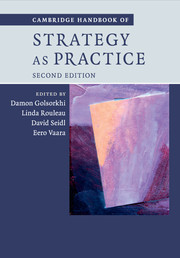Book contents
- Frontmatter
- Contents
- List of figures
- List of tables
- List of boxes
- List of contributors
- Preface to the Second Edition
- Introduction: what is strategy as practice?
- Part I Ontological and Epistemological Questions
- Part II Theoretical Resources: Social Theory
- 8 Giddens, structuration theory and strategy as practice
- 9 An activity theory approach to strategy as practice
- 10 A Bourdieusian perspective on strategizing
- 11 An economies-of-worth perspective on strategy as practice: justification, valuation and critique in the practice of strategy
- 12 A Wittgensteinian perspective on strategizing
- 13 A Foucauldian perspective on strategic practice: strategy as the art of (un)folding
- 14 A narrative approach to strategy as practice: strategy-making from texts and narratives
- 15 Actor–network theory and strategy as practice
- Part III Theoretical Resources: Organization and Management Theories
- Part IV Methodological Resources
- Part V Substantive Topic Areas
- Index
- References
11 - An economies-of-worth perspective on strategy as practice: justification, valuation and critique in the practice of strategy
from Part II - Theoretical Resources: Social Theory
Published online by Cambridge University Press: 05 October 2015
- Frontmatter
- Contents
- List of figures
- List of tables
- List of boxes
- List of contributors
- Preface to the Second Edition
- Introduction: what is strategy as practice?
- Part I Ontological and Epistemological Questions
- Part II Theoretical Resources: Social Theory
- 8 Giddens, structuration theory and strategy as practice
- 9 An activity theory approach to strategy as practice
- 10 A Bourdieusian perspective on strategizing
- 11 An economies-of-worth perspective on strategy as practice: justification, valuation and critique in the practice of strategy
- 12 A Wittgensteinian perspective on strategizing
- 13 A Foucauldian perspective on strategic practice: strategy as the art of (un)folding
- 14 A narrative approach to strategy as practice: strategy-making from texts and narratives
- 15 Actor–network theory and strategy as practice
- Part III Theoretical Resources: Organization and Management Theories
- Part IV Methodological Resources
- Part V Substantive Topic Areas
- Index
- References
Summary
Introduction
How do individuals justify their viewpoints during public disputes? What practices do they mobilize to so do? How do they proceed to evaluate whether a state of affairs is fair or unfair? The term ‘economies-of-worth’ – sometimes also called ‘French pragmatist sociology’ or the ‘School of Conventions’ – describes a set of French sociological works that address these questions. These works, described by Baert and Carreira da Silva (2010: 43) as ‘the most important post-Bourdieu treatise in French sociology’ (see also Stark 2000), focus on the competences of actors to reach agreements in mundane situations of disputes (Boltanski 2012 [1990]; 2013; Boltanski and Thévenot 2006 [1991]; Thévenot 2007). They do so in particular by building a comprehensive framework to analyse how social actors evaluate the worth of things and beings across multiple social spheres, establish equivalences between them and, in so doing, forge agreements that enable collective action (Boltanski and Thévenot 2006 [1991]). Initially, these works sought to distance themselves from the critical sociology of Karl Marx or Pierre Bourdieu, notably by refusing to explain social relations by means of structures, power or violence but, rather, by means of actors’ practices (Boltanski 2012 [1990]; Cochoy 2000). Such practices are broadly defined to include the discursive, cognitive and material resources that actors deliberately mobilize in specific social situations. As such, they are consistent with most definitions currently in use in strategy-as-practice studies (for example, Reckwitz 2002; Schatzki, Knorr Cetina and von Savigny 2001). Among the diversity of social practices that fit this description, however, economies-of-worth scholars have paid particular attention to the practices of justification, valuation and critique, which they deem to be essential for solving disputes or dealing with injustice in everyday social life.
Such a focus makes the economies-of-worth framework a fitting perspective to advance current research in strategy as practice. Despite a growing body of studies elucidating different aspects of the practice of strategy, surprisingly little is known of the normative, evaluative and critical practices that underlie the making of strategy (Seidl and Whittington 2014; Vaara and Whittington 2012; Whittington 2006). This comes as a surprise given that strategy practitioners spend a great deal of their time justifying (Hendry 2000), evaluating (Simons 1995) and defending their strategic decisions in the wake of criticisms from staff, board members, analysts and other stakeholders (Whittington et al. 2003).
- Type
- Chapter
- Information
- Cambridge Handbook of Strategy as Practice , pp. 199 - 219Publisher: Cambridge University PressPrint publication year: 2015
References
- 11
- Cited by

